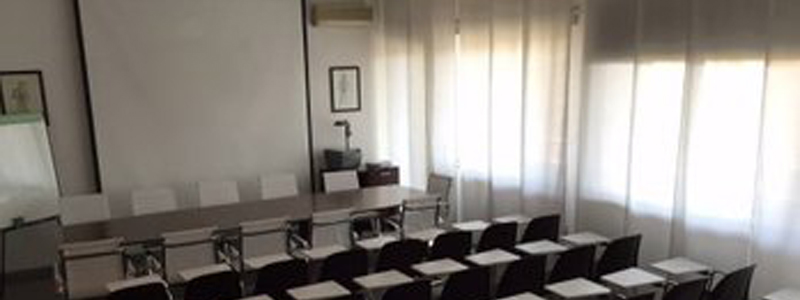
The primary educational scope of UNISRITA is to build up a new, modern, advanced, University-level Institute, able to cover some aspects currently neglected by the University panorama. UNISRITA aims to cover, along the time, the requests of the three levels of graduation. Therefore it includes, and prefers, Master-level courses, programs of education to PhD, High-level Training, as well as stages in research strategies and innovation, also in Open Science.
The Advanced School Santa Rita (UNISRITA) is included within the Register of Advanced University Institutes accredited by the Ministry of Education, University and Research (MIUR).
By priority choice, UNISRITA aims to become qualified as a University Accredited by the “European University Assurance” (EUA: Avenue de l’Yser 24 · 1040 Brussels, Belgium) and recognized by the MIUR, under the rules and regulations issued by the “Board of Directors” of EUA.
UNISRITA is determined, therefore, to satisfy the requests of EUA, which represents the Deans and the University Organizations of 47 Countries at international level. Since its beginnings with the Bologna Process, EUA plays a crucial role with its influence on European Countries for advanced education, research and innovation. Through EUA, European governments are now forced to hear the voice of universities and advanced Institutes, whatever its global impact could be.
In this international trend the new University UNISRITA inserts itself with:
- Its University level Leadership
- Its strategy of Teaching Quality
- Its organizational context, both internally and externally (internationalization)
- Its Governance and funding.
- Its activities of global activities of research, innovation anc development, in strict contact with SMEs and not only with Public Entities
The management and directorate of UNISRITA are engaged in implementing their leading function towards the quality of teaching by:
- Taking the responsibility to implement the University teaching system under quality requirements
- Guaranteeing the elaboration and implementation of the university’s quality policy within the guidelines and the directions and of the UNISRITA organizational strategy.
- Guaranteeing the integration of requirements of the management system within the procedures of teaching and of university management.
- Promoting the approach by processes and “risk-based-thinking” within the teaching and management procedures.
- Guaranteeing the availability of resources needed to the implementation of the university system of quality teaching.
- Keeping transparent, by top-down procedures, the importance of an effective management of the teaching requirements and of their compliance with the same guaranteed quality requirements (and town-top feed-back)
- Guaranteeing that the system of teaching quality assurance meets the foreseen and expected results.
- Actively involving all the personnel collaborating to the effective success of the university quality system, while directing and supporting them.
- Promoting the improvement of all the university aspects
- Providing and guaranteeing the support to all the other related management roles, in order to let them demonstrate their leading capacity on each specific area.
Departments
- Physics and Science of Systems
- Chemistry
- Biology and Ecology
- Psychology
- Criminology and Forensic Sciences
- Integrated Medicine and Pharmacology
- Juridical Sciences
- Biomedical and Neuro-motor Sciences
- Experimental Medicine
- Communication Sciences
- Neurosciences
Basic principles of Unisrita
- Legitimacy
- Trasparency
- Reliability
- Independence and autonomy
Research and innovation
Establishing profitable and long-lasting links with other Universities
Currently existing a priority agreement with Lublin University Poland
Projects already presented to the EU, requiring funds to produce knowledge related to exchanges and sharing in the scientific fields and technological innovation.
UNISRITA intends to organize conferences, seminars, workshops, projects and working groups in innovation and research
Foreseen and expected objectives include the development of activities in the following aspects of research and innovation:
- Energy (Horizon 2020).
- Ecology, Economy and Energy (the Three E).
- Juridical Sciences.
- Psychology, Didactic Psychoanalysis.
- Natural Sciences (Physics, Chemistry, Biology, Veterinary).
- Science and Engineering of Systems.
- Integrated Medicine and
- Cyber Intelligence and Information.
- Cyber-Forensics (Criminology and Forensic Sciences).
- Mathematics and Complexity.
To conclude, the mission of UNISRITA is composed following modern teaching criteria, having their roots in the Bologna Process, what Europe (EUA) has wanted to recognize in Italy as originally founding the University conception. The priority scope is to reach and guarantee the teaching effectiveness, though the Deming cycle (Plan, Do, Check, Act) which includes, additional to the frontal lecture, also teaching on-line and on the job. Therefore, tools and means offered by modern technology can be fully employed
Expected results include the acquisition, by the students, of advanced levels of knowledge, at international level. To this end, accreditations of teaching quality of of European standards (EUA etc.), as well as Italian (MIUR), are pursued. By this methodology, UNISRITA hopes to reach reasonable levels of rating, consistent with the international levels managed by American and Anglo-Saxon bodies and organizations.
